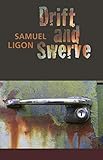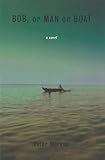 Samuel Ligon – Drift and Swerve. In this collection of sharp, unforgettable stories, Ligon’s wayward American men and women slog through cities like Providence and Orlando and are always looking for something else, something not quite attainable. Ligon’s work is sometimes called bleak, but there is great humor and hope and humanity in these stories.
Samuel Ligon – Drift and Swerve. In this collection of sharp, unforgettable stories, Ligon’s wayward American men and women slog through cities like Providence and Orlando and are always looking for something else, something not quite attainable. Ligon’s work is sometimes called bleak, but there is great humor and hope and humanity in these stories.
“Cleavage” starts:
It is summer again and the breasts rise up everywhere, calling out to me, demanding my rapt, empty attention. Every woman over fifty has disappeared as the various bare portions of breasts present themselves, tops here, sides over there, a trophy set at the beach unwrapped and bronzing. Carla watches me watch and I try to restrain myself, but they are everywhere before me, and even a quick glance or a longer glance is a sign of my restraint.
It’s horrible.
The way Ligon captures this conflicted narrator’s predicament, from the fragile relationship to a family tragedy, is classic storytelling.
 Blake Butler – Scorch Atlas. This collection of interwoven stories concerning broken and confused survivors depicts, amongst many other things, different types of rain, none of them good for the environment, or what’s left of it. Butler’s post-apocalyptic world is relentlessly dark and frightening, and yet it’s beautiful. In “Television Milk” we have a mother held hostage by her children, who feed on her.
Blake Butler – Scorch Atlas. This collection of interwoven stories concerning broken and confused survivors depicts, amongst many other things, different types of rain, none of them good for the environment, or what’s left of it. Butler’s post-apocalyptic world is relentlessly dark and frightening, and yet it’s beautiful. In “Television Milk” we have a mother held hostage by her children, who feed on her.
The children let me out around the time for dinner and brought me downstairs to milk. It’d been several years since I’d nursed but somehow my glands could still produce. At first it’d taken some coaxing, a pinch, a punch, a howl, but eventually they had me gushing.
Perhaps Scorch Atlas can be read as a survival guide for December 21, 2012. Either way if you love language and how it can move across the page and burst in your ear this is a must-read. If there is a what’s next in American Letters, Blake Butler is it.
 Peter Markus – Bob, or Man on Boat. This is transcendent music, a 133 page song of incredible beauty from America’s preeminent poet of earthly and heavenly matter. No other writer can make from mud and river and fish and moon the luminous world Markus paints here in this story of a father and son fishing on the river. Open the book anywhere and you will find the spare and haunting prose Markus has become renowned for:
Peter Markus – Bob, or Man on Boat. This is transcendent music, a 133 page song of incredible beauty from America’s preeminent poet of earthly and heavenly matter. No other writer can make from mud and river and fish and moon the luminous world Markus paints here in this story of a father and son fishing on the river. Open the book anywhere and you will find the spare and haunting prose Markus has become renowned for:
I once saw Bob, at dawn, standing up in his boat, facing where the sun was rising, and what Bob was doing, it looked like to me, it sounded like to me, was he was screaming, though what he was saying, what he was hollering, this I could not hear.
When I told this to a friend in town who is no stranger to Bob, what he said was that Bob was yelling at the sun, that he was telling it to stay where it was, for it to go away, because Bob didn’t want the night, and the night’s fishing, to come to an end.
Likewise, you will not want to see Bob come to an end, or at least, you will count the days till Peter Markus’ next piece of music.








